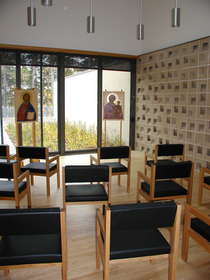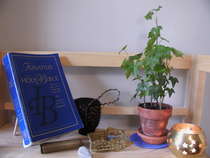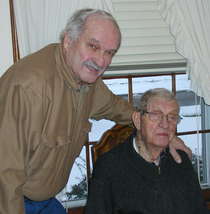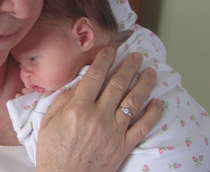 PHOTO: Mary van Balen
PHOTO: Mary van Balen
(Originally published in the Catholic Times, April 5, 2012 © 2012 Mary van Balen)
Are you going to make some this year? my sister asked as she looked at hot cross buns sitting off to the right in the restaurants generous display of pastries and muffins. She was referring to my annual baking of dozens of the Easter treats and giving them away to family, friends, and neighbors. I didnt bake any last year. We were beginning to clean out our parents home, readying it for sale. I didnt have the heart.
I hope so, I replied, not able to make the commitment. Dad died in September. A contract on the house is pending and I am keeping my first Lent in a new flat. I do hope so. Baking and sharing hot cross buns is as good for my spirit as I hope receiving them is for others. Besides, the world is hungry for more than bread, and the small raisin-filled rolls sealed with a white icing cross dripping over their shiny domes carry more than sweetness and calories. They are packed with promise and the bakers humble efforts to participate in the Easter Mystery. To be bread.
In her book, Still: Notes on a Mid-Faith Crisis, Lauren Winner tells of a similar experience. After coming home from church on Sunday afternoons, she baked muffins and loaves of bread, and wanting to feed others as she had been fed at Mass, she left them on doorsteps around town.
It is a priests heart. It is Gods heart. It is the heart of Jesus living in each one of us that sees hunger and wants to feed it. That sees need and wants to meet it. That sees suffering and wants to stop it.
Jesus showed us that heart when he bent down and washed the feet of his followers as the gathered for their last meal together. I guess it took such unexpected action to jolt them into recognition of just what being one of Jesus disciples meant. Just incase they missed the point, Jesus untied the apron around his waist and explained: Do you realize what I have done for you?…I have given you a model to follow, so that as I have done for you, you should also do.
We can all be a bit thick headed, so at supper, Jesus repeated his instructions: This is my body that is for you… Jesus giving himself away again, to feed hungry souls that didnt even know for sure what they were craving.
News these past couple of weeks has given us some idea of what our world craves, whether it knows it or not. Our country needs to recognize the racism that still rots its soul. Listening to a black mother admonishing her son not to run with anything in his hand, to always say Yes sir and Yes Mam when confronted by authority, wrenched my heart. White mothers may say similar things, but they dont do it because they fear for their sons lives. An admiral in civies recounts being stopped and frisked for walking while black as he described it. Our country craves justice and compassion.
Innocents slaughtered in Syria perplex world leaders and sicken our stomachs. Nuclear weapons, let out of the box during World War II, continue their nefarious spread. Refusal to engage in genuine dialog sabotages meaningful elections. Exclusion of womens voices and experiences from public debate skews conclusions.
We are hungry for the Holy One. Nothing else is enough. When Jesus walked the earth, his day just as warmongering and wounded as our own, he showed us what we needed.
He showed us how to be bread for the hungry, how to be justice for the persecuted, how to be peace in the face of violence. Patiently, he told those who gathered with him around the table, men and women (I cant imagine a big dinner being prepared by fishermen and tax collectors. Women and children helping to stir pots and carry plates had to be there.) It was as simple as baking hot cross buns or loaves of bread and leaving them around town. And as difficult.
Do for others as I have done for you. It is as simple as washing each others feet. And as difficult. It leads to the cross. It leads to resurrection.

 PHOTO: Mary van Balen (Originally published in the Catholic Times, March 11, 2012 © 2012 Mary van Balen)
PHOTO: Mary van Balen (Originally published in the Catholic Times, March 11, 2012 © 2012 Mary van Balen) Lent is a time that reminds us to consider our goal. Whatever discipline or practices we are using to observe this season are meant to help us focus on what is most important in our lives: our relationship with the Holy One. That is not something apart from the rest of our lives, but rather integral to everything we do. How we interact with people at our workplace, what we do to recreate body and spirit, how we respond to needs of others, how we live with our families and friends.
Lent is a time that reminds us to consider our goal. Whatever discipline or practices we are using to observe this season are meant to help us focus on what is most important in our lives: our relationship with the Holy One. That is not something apart from the rest of our lives, but rather integral to everything we do. How we interact with people at our workplace, what we do to recreate body and spirit, how we respond to needs of others, how we live with our families and friends. The Wisdom we seek dwells within, a gift of the Incarnation. These weeks are good times to reflect on using Scripture and other writing that feeds our spirits. It is a time to reflect on how our relationship with God influences our interaction with the world.
The Wisdom we seek dwells within, a gift of the Incarnation. These weeks are good times to reflect on using Scripture and other writing that feeds our spirits. It is a time to reflect on how our relationship with God influences our interaction with the world. 
 PHOTO: Mary van Balen (First appeared in The Catholic Times, February 19, 2012 ©2012 Mary van Balen)
PHOTO: Mary van Balen (First appeared in The Catholic Times, February 19, 2012 ©2012 Mary van Balen) My brothers, sisters, and most of our cousins came to the funeral home to remember Adrian and share our stories. Afterward, we gathered at a local park shelter house to share food, laughter, and more stories. Death provided an opportunity for us to reconnect and to celebrate not only Adrians life, but also the lives of family and friends that were intertwined with his.
My brothers, sisters, and most of our cousins came to the funeral home to remember Adrian and share our stories. Afterward, we gathered at a local park shelter house to share food, laughter, and more stories. Death provided an opportunity for us to reconnect and to celebrate not only Adrians life, but also the lives of family and friends that were intertwined with his. Liturgically, we are approaching Lent, when we celebrate the Paschal Mystery of Christs birth, death, and resurrection. This is the ultimate understanding of death leading to new life. Jesus was born lived his life, and in the end, was murdered by humanity that could not accept the challenge of love and compassion he proclaimed.
Liturgically, we are approaching Lent, when we celebrate the Paschal Mystery of Christs birth, death, and resurrection. This is the ultimate understanding of death leading to new life. Jesus was born lived his life, and in the end, was murdered by humanity that could not accept the challenge of love and compassion he proclaimed.